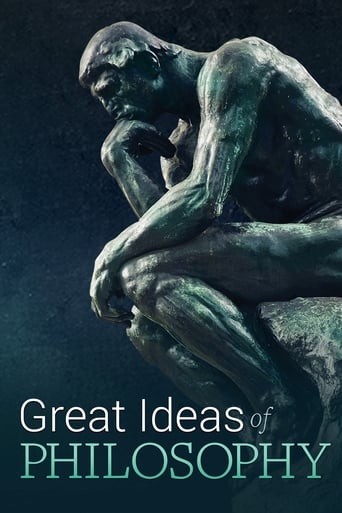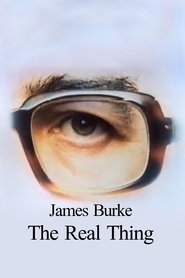

The Great Ideas of Philosophy, 2nd Edition
Season - Episode
1
Season 1 Jan 01, 2004
-
 1 - 1From the Upanishads to Homer Jan 01, 2004
1 - 1From the Upanishads to Homer Jan 01, 2004 -
 1 - 2Philosophy—Did the Greeks Invent It? Jan 01, 2004
1 - 2Philosophy—Did the Greeks Invent It? Jan 01, 2004 -
 1 - 3Pythagoras and the Divinity of Number Jan 01, 2004
1 - 3Pythagoras and the Divinity of Number Jan 01, 2004 -
 1 - 4What Is There? Jan 01, 2004
1 - 4What Is There? Jan 01, 2004 -
 1 - 5The Greek Tragedians on Man’s Fate Jan 01, 2004
1 - 5The Greek Tragedians on Man’s Fate Jan 01, 2004 -
 1 - 6Herodotus and the Lamp of History Jan 01, 2004
1 - 6Herodotus and the Lamp of History Jan 01, 2004 -
 1 - 7Socrates on the Examined Life Jan 01, 2004
1 - 7Socrates on the Examined Life Jan 01, 2004 -
 1 - 8Plato's Search For Truth Jan 01, 2004
1 - 8Plato's Search For Truth Jan 01, 2004 -
 1 - 9Can Virtue Be Taught? Jan 01, 2004
1 - 9Can Virtue Be Taught? Jan 01, 2004 -
 1 - 10Plato's Republic—Man Writ Large Jan 01, 2004
1 - 10Plato's Republic—Man Writ Large Jan 01, 2004 -
 1 - 11Hippocrates and the Science of Life Jan 01, 2004
1 - 11Hippocrates and the Science of Life Jan 01, 2004 -
 1 - 12Aristotle on the Knowable Jan 01, 2004
1 - 12Aristotle on the Knowable Jan 01, 2004 -
 1 - 13Aristotle on Friendship Jan 01, 2004
1 - 13Aristotle on Friendship Jan 01, 2004 -
 1 - 14Aristotle on the Perfect Life Jan 01, 2004
1 - 14Aristotle on the Perfect Life Jan 01, 2004 -
 1 - 15Rome, the Stoics, and the Rule of Law Jan 01, 2004
1 - 15Rome, the Stoics, and the Rule of Law Jan 01, 2004 -
 1 - 16The Stoic Bridge to Christianity Jan 01, 2004
1 - 16The Stoic Bridge to Christianity Jan 01, 2004 -
 1 - 17Roman Law—Making a City of the Once-Wide World Jan 01, 2004
1 - 17Roman Law—Making a City of the Once-Wide World Jan 01, 2004 -
 1 - 18The Light Within—Augustine on Human Nature Jan 01, 2004
1 - 18The Light Within—Augustine on Human Nature Jan 01, 2004 -
 1 - 19Islam Jan 01, 2004
1 - 19Islam Jan 01, 2004 -
 1 - 20Secular Knowledge—The Idea of University Jan 01, 2004
1 - 20Secular Knowledge—The Idea of University Jan 01, 2004 -
 1 - 21The Reappearance of Experimental Science Jan 01, 2004
1 - 21The Reappearance of Experimental Science Jan 01, 2004 -
 1 - 22Scholasticism and the Theory of Natural Law Jan 01, 2004
1 - 22Scholasticism and the Theory of Natural Law Jan 01, 2004 -
 1 - 23The Renaissance—Was There One? Jan 01, 2004
1 - 23The Renaissance—Was There One? Jan 01, 2004 -
 1 - 24Let Us Burn the Witches to Save Them Jan 01, 2004
1 - 24Let Us Burn the Witches to Save Them Jan 01, 2004 -
 1 - 25Francis Bacon and the Authority of Experience Jan 01, 2004
1 - 25Francis Bacon and the Authority of Experience Jan 01, 2004 -
 1 - 26Descartes and the Authority of Reason Jan 01, 2004
1 - 26Descartes and the Authority of Reason Jan 01, 2004 -
 1 - 27Newton—The Saint of Science Jan 01, 2004
1 - 27Newton—The Saint of Science Jan 01, 2004 -
 1 - 28Hobbes and the Social Machine Jan 01, 2004
1 - 28Hobbes and the Social Machine Jan 01, 2004 -
 1 - 29Locke’s Newtonian Science of the Mind Jan 01, 2004
1 - 29Locke’s Newtonian Science of the Mind Jan 01, 2004 -
 1 - 30No matter? The Challenge of Materialism Jan 01, 2004
1 - 30No matter? The Challenge of Materialism Jan 01, 2004 -
 1 - 31Hume and the Pursuit of Happiness Jan 01, 2004
1 - 31Hume and the Pursuit of Happiness Jan 01, 2004 -
 1 - 32Thomas Reid and the Scottish School Jan 01, 2004
1 - 32Thomas Reid and the Scottish School Jan 01, 2004 -
 1 - 33France and the Philosophes Jan 01, 2004
1 - 33France and the Philosophes Jan 01, 2004 -
 1 - 34The Federalist Papers and the Great Experiment Jan 01, 2004
1 - 34The Federalist Papers and the Great Experiment Jan 01, 2004 -
 1 - 35What Is Enlightenment? Kant on Freedom Jan 01, 2004
1 - 35What Is Enlightenment? Kant on Freedom Jan 01, 2004 -
 1 - 36Moral Science and the Natural World Jan 01, 2004
1 - 36Moral Science and the Natural World Jan 01, 2004 -
 1 - 37Phrenology—A Science of the Mind Jan 01, 2004
1 - 37Phrenology—A Science of the Mind Jan 01, 2004 -
 1 - 38The Idea of Freedom Jan 01, 2004
1 - 38The Idea of Freedom Jan 01, 2004 -
 1 - 39The Hegelians and History Jan 01, 2004
1 - 39The Hegelians and History Jan 01, 2004 -
 1 - 40The Aesthetic Movement—Genius Jan 01, 2004
1 - 40The Aesthetic Movement—Genius Jan 01, 2004 -
 1 - 41Nietzsche at the Twilight Jan 01, 2004
1 - 41Nietzsche at the Twilight Jan 01, 2004 -
 1 - 42The Liberal Tradition—J. S. Mill Jan 01, 2004
1 - 42The Liberal Tradition—J. S. Mill Jan 01, 2004 -
 1 - 43Darwin and Nature’s “Purposes” Jan 01, 2004
1 - 43Darwin and Nature’s “Purposes” Jan 01, 2004 -
 1 - 44Marxism—Dead But Not Forgotten Jan 01, 2004
1 - 44Marxism—Dead But Not Forgotten Jan 01, 2004 -
 1 - 45The Freudian World Jan 01, 2004
1 - 45The Freudian World Jan 01, 2004 -
 1 - 46The Radical William James Jan 01, 2004
1 - 46The Radical William James Jan 01, 2004 -
 1 - 47William James's Pragmatism Jan 01, 2004
1 - 47William James's Pragmatism Jan 01, 2004 -
 1 - 48Wittgenstein and the Discursive Turn Jan 01, 2004
1 - 48Wittgenstein and the Discursive Turn Jan 01, 2004 -
 1 - 49Alan Turing in the Forest of Wisdom Jan 01, 2004
1 - 49Alan Turing in the Forest of Wisdom Jan 01, 2004 -
 1 - 50Four Theories of the Good Life Jan 01, 2004
1 - 50Four Theories of the Good Life Jan 01, 2004 -
 1 - 51Ontology—What There "Really" Is Jan 01, 2004
1 - 51Ontology—What There "Really" Is Jan 01, 2004 -
 1 - 52Philosophy of Science—The Last Word? Jan 01, 2004
1 - 52Philosophy of Science—The Last Word? Jan 01, 2004 -
 1 - 53Philosophy of Psychology and Related Confusions Jan 01, 2004
1 - 53Philosophy of Psychology and Related Confusions Jan 01, 2004 -
 1 - 54Philosophy of Mind, If There Is One Jan 01, 2004
1 - 54Philosophy of Mind, If There Is One Jan 01, 2004 -
 1 - 55What makes a Problem “Moral” Jan 01, 2004
1 - 55What makes a Problem “Moral” Jan 01, 2004 -
 1 - 56Medicine and the Value of Life Jan 01, 2004
1 - 56Medicine and the Value of Life Jan 01, 2004 -
 1 - 57On the Nature of Law Jan 01, 2004
1 - 57On the Nature of Law Jan 01, 2004 -
 1 - 58Justice and Just Wars Jan 01, 2004
1 - 58Justice and Just Wars Jan 01, 2004 -
 1 - 59Aesthetics—Beauty Without Observers Jan 01, 2004
1 - 59Aesthetics—Beauty Without Observers Jan 01, 2004 -
 1 - 60God—Really? Jan 01, 2004
1 - 60God—Really? Jan 01, 2004
Overview
These lectures offer a coherent and beautifully articulated introduction to the great philosophic conversation of the ages. They cover an enormous range of seminal thinkers and perspectives, but always from the vantage point of the enduring questions: What can we know? How ought we to act? How should we order our life together?
Year 2004
Studio Wonderium, The Great Courses
Director
Crew
Popularity 0.2059
Language English















